My attempt to share stories for each letter of the alphabet featuring our life in Austin B.C. (Before Children) 1975-1985. The 70s were a long time ago. 26 stories might be a stretch for my brain, but I have made it to F– as has the Sepia Saturday prompt photo for this week.
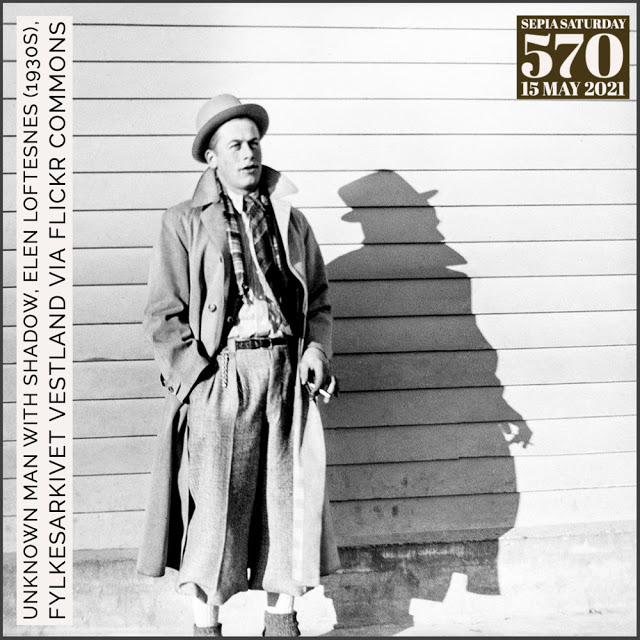
Unknown Man With Shadow, Sogndal, 1930s by Elen Loftesnes, Fylkesarkivet Vestland, Norway. Sepia Saturday 570 (2105050)
In May of 1975, I graduated from a Baptist university. It was only a couple of years prior to my arrival on campus that female students were finally allowed to wear pants outside their dorm rooms. If that rule had still been in effect when I entered, I would have chosen some other university.
By the time we married in March of 1975, the tradition of taking the name of one’s husband was no longer a given. A woman could make a choice: keep her maiden name, take her husband’s surname, or use both surnames – usually written with a hyphen. With the name Kathy Smith, I wasn’t that keen on keeping my very common last name attached to my very common first name. Also I wasn’t feeling an attachment to my surname at the time, so I took my husband’s last name and awaited the day when someone would ask me how to spell it. Looking back, I was a relative newcomer to Texas and I guess it hadn’t sunk in yet that his last name is common in Texas, so I’m not sure that ever happened. For not entirely feminist reasons, I walked myself down the aisle, breaking the tradition of being “given” to my husband.
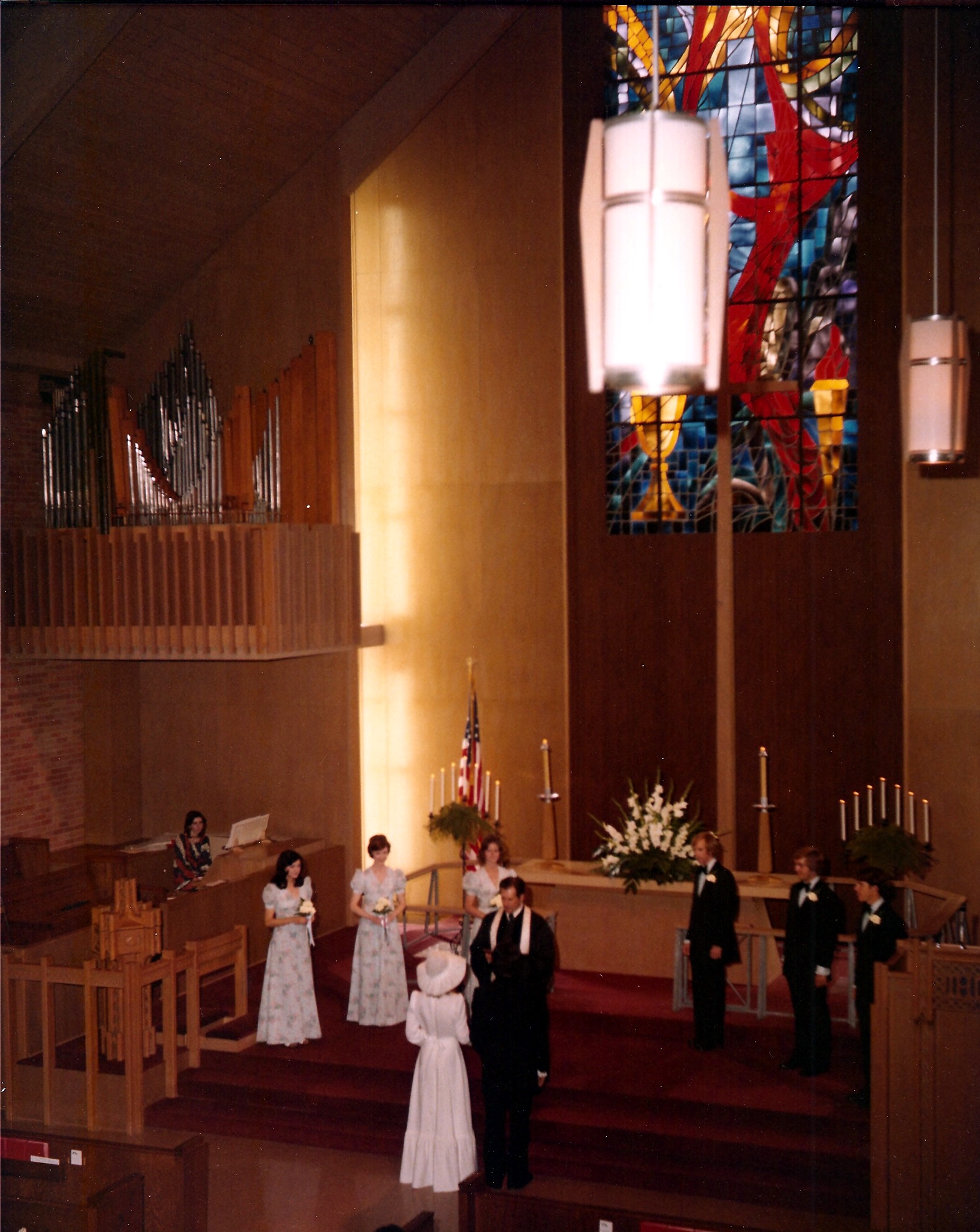
I think my most “rebellious” act against traditional gender roles by that time was refusing my mother’s advice to take typing in high school. She saw it as a path to employment. I saw it as a path to jobs I was not interested in. If it was discovered that I could type, I reasoned, then no matter what job I applied for, I could be hired for my typing skills rather than other skills. I ended up having to enroll in a typing class at a local community college while I was attending university because it was getting too expensive to pay someone to type my research papers. I dropped out of the class as soon as I could peck well enough to get my school work done. I still didn’t have typing skills, so I considered it a win-win.
The first regular issue of Ms. Magazine hit the newsstands in July 1972. I don’t remember if I bought it, but I was an early subscriber and surely had this 1975 “halfway through the seventies” issue. Years later, when I cleared out old magazines, I tore out all of the “Free to Be You and Me” stories to share with any future children.
I suppose you could say I was a fledgling feminist when I arrived in Austin in 1975. For lack of a better word to match the letter F, I decided to share a few anecdotes that come to mind.
In addition to subscribing to Ms. Magazine, I joined many other young women in purchasing Woman’s Body: An Owner’s Manuel, published in 1977. Unfortunately, many of us needed it. My copy looks a bit dog-eared.
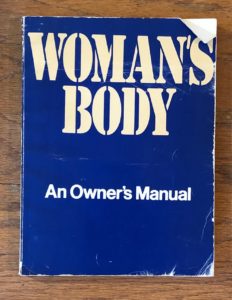
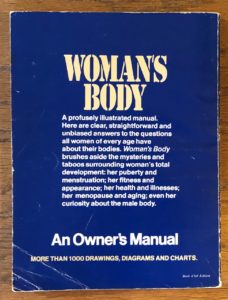
It was important to me to find a church to attend once we were settled into our apartment. I had grown up in Methodist and Presbyterian churches. My husband and I married in a Methodist Church, much to the dismay of his Catholic family. One of the churches we visited not far from our apartment was Faith Presbyterian. During our first or second visit, the minister gave a sermon with a feminist message. I don’t remember what he said, only that he was the first minister I had heard say such words from the pulpit. I told my husband that this was the church I wanted to attend. I found Rev. Wright’s obituary, which echoes my memory of him as an intelligent, compassionate, and inclusive pastor. We continued our attendance there for several years, but there weren’t many people our age and, at some point, decided to look for a different congregation.
 One Sunday we went to First Methodist downtown. Again, my feminist radar lit up. Not because of the sermon, but because there were actual women up front in positions of leadership. Not the senior pastor, but an associate pastor, a deacon, and a seminary intern were all women. The seminary student was from the Baptist tradition, where women were not allowed as pastors. She was attending Austin Presbyterian Seminary and interning at this Methodist church where she was welcomed to the pulpit. Again, I told my husband that this church was my preference. It has since been pointed out to me that there were no women ushers in the church at that time, but I apparently didn’t notice. When we are so accustomed to a tradition or cultural norm, we don’t always have eyes to see what is missing from the picture. And yet … it felt so soul-refreshing to have women up there with voices to speak their truth and understanding and to share in leadership and decision-making.
One Sunday we went to First Methodist downtown. Again, my feminist radar lit up. Not because of the sermon, but because there were actual women up front in positions of leadership. Not the senior pastor, but an associate pastor, a deacon, and a seminary intern were all women. The seminary student was from the Baptist tradition, where women were not allowed as pastors. She was attending Austin Presbyterian Seminary and interning at this Methodist church where she was welcomed to the pulpit. Again, I told my husband that this church was my preference. It has since been pointed out to me that there were no women ushers in the church at that time, but I apparently didn’t notice. When we are so accustomed to a tradition or cultural norm, we don’t always have eyes to see what is missing from the picture. And yet … it felt so soul-refreshing to have women up there with voices to speak their truth and understanding and to share in leadership and decision-making.
As a graduate student in Social Work, one of my field placements was at a clinic run by Austin-Travis County MHMR (Mental Health and Mental Retardation). I was supervised by a woman social worker and, social work being a traditionally female profession, there were other women in the clinic. My field placement supervisor reviewed my work, but the psychiatrist had to sign off on my records just like all of the other social workers. He was not in our clinic every day, but was in the office on Friday afternoons to sign off on charts. It was an open office with lots of desks in a big room. I have not forgotten the day he put me on the spot, “jokingly” telling me to sit down while he signed my case folders and patting his lap. Embarrassed and caught completely off guard, but not wanting to make a scene or mess up our student/authority relationship, I played along. Ha Ha Ha! Looking back, I was 22 or 23 and had no resource within myself to know what else to do. Was this just a harmless joke? Was the joke on me? Was it a test? Did he do this to all of the other female students? I didn’t see it if he did. The term “sexual harassment” was first used publicly in 1975. It was not yet a part of our lexicon and there were no workplace guidelines, rules, or laws to address this kind of behavior. I look back and wonder why the older women in the office didn’t help me out. A heads up, maybe? Surely he had done this before. The times they were a’changin’, but not really. Not yet.
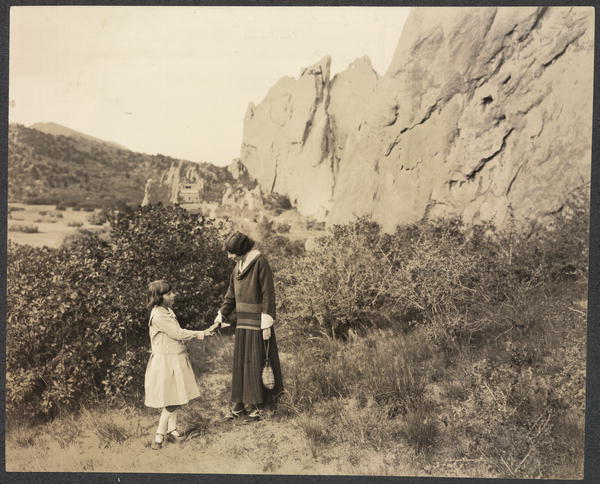
H.L. Standley, Colorado Springs, Colo. Alice Paul, leader of the feminist movement in America and vice president of the Woman’s Party with Mildred Bryan, youngest Colorado feminist in the Garden of the Gods at Colorado Springs where the Party will present its Equal Rights Pageant on September 23rd, launching its western campaign for. United States Colorado Colorado Springs, 1923. [Sept] Photograph. https://www.loc.gov/item/mnwp000429/.
I wouldn’t call the student population diverse. We were mostly white. The age range varied a little. Many of the students had worked for a few years and decided to go back to school or change careers. One of the women came from a convent where she had been on the path to becoming a nun, but had a change of heart. I was one of the younger students in the program.
I was quiet and rather shy. I didn’t say anything for the first few group meetings other than maybe some kind of introduction. I sat and listened and took in, but remained silent. Until one day. I don’t know what was being discussed, but I had something to contribute and I opened my mouth and spoke. I must have said something insightful, because that self-assured, formerly-almost-nun continued to look at me and said, “I always thought you were just a dumb blonde.”
I didn’t hear anything else she said because I was so dumb-struck by her words. What a thing to say to another woman. I guess I passed her test for being smart enough or whatever and she later invited me to the women’s consciousness-raising group that met at her house near campus. I accepted her invitation.
Well, these are a few memories that came to mind from my life in the late 70s. I later came to describe myself as a disgruntled feminist because the gender equal society I envisioned in my youth did not come into being.
This is my contribution to Sepia Saturday.
Sepia Saturday provides bloggers with an opportunity to share their history through the medium of photographs. Historical photographs of any age or kind become the launchpad for explorations of family history, local history and social history in fact or fiction, poetry or prose, words or further images. If you want to play along, sign up to the link, try to visit as many of the other participants as possible, and have fun.
Please visit other Sepia Saturday bloggers here: Sepia Saturday


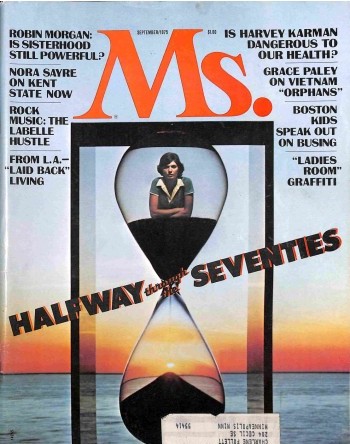

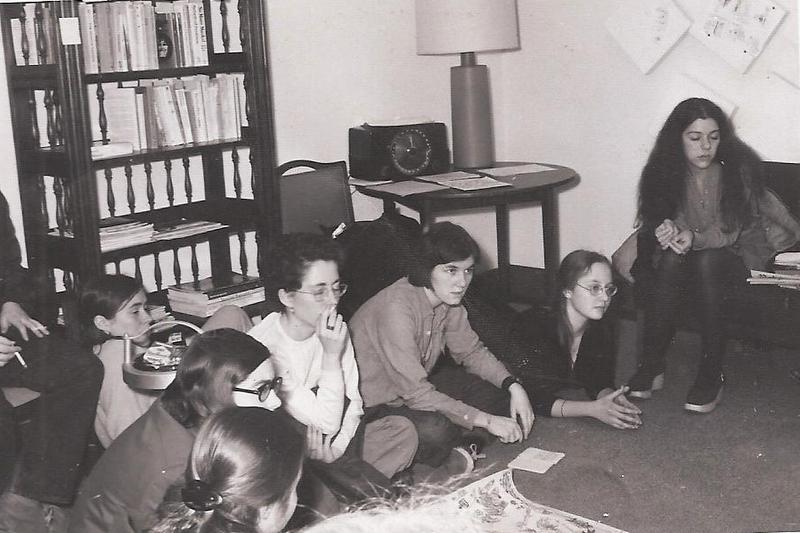
Fascinating personal take on modern history.
Thanks for sharing another retro 70s story. We have all come a long way from that idealistic flower power era. I think memory sometimes compresses time into little manageable segments that we replay in loops leaving out the boring bits. I can remember several pointed remarks like your former nun’s comment that changed my life too. Some person, a grandfather, a friend, a stranger makes a casual but critical remark that we take personally. It motivates us to react in an unexpected way, shifting our compass point to a new direction. Then 50 years later we wonder how we got here.
I am always perplexed by what remains in my memory and what is lost. Friends from the past often ask if I remember something and I don’t. If two or three of us put our memories together, we get a fuller picture of the past, but it is still incomplete. And probably colored by some emotion or interpretation of the moment.
I graduated just ahead of you and fully relate to your memories. I was probably much more a witness to the “times – they are a’changing” than you who jumped right into the middle of it. While I don’t recall any experience with sexual harassment, I did face gender discrimination at a job interview for a position as an English teacher. After a few questions, the principal said, “What we are really looking for is a football coach who can teach English.” Today I know what I would say to that, but back then I just sat there like there was still a chance I could get the job.
Do you have any children? Do you plan to have a family? Lots of questions and situations like yours that wouldn’t pass now. The job you applied for was obviously a job for a coach – but that wouldn’t be full-time, so the coach had to be able to teach something. I had several history teachers who were coaches.
I was out in the work-a-day world in the ’60s. I don’t really know where my total confidence in myself came from? I wasn’t necessarily brought up to be such an independent person. For whatever reason I just figured I should be respected as such. Perhaps some independent female forebear’s personality was simply passed on to me through genetics? Who knows. I was lucky because that independence served and has served me well all these years in all aspects of my life. I do remember one incident when I was working in my 20s which might have been considered mild “sexual harassment”, but I didn’t consider it so. I was wearing a dark green sweater with a red & green plaid mini skirt and long dark green cable knit stockings with red sandal heels. Our dept. manager was standing in the doorway of his office when I walked by and said “When does the dancing start?” I guess some might have considered that offensive? I just smiled and broke into a couple of fancy dance steps. Everyone laughed and applauded, I bowed, and it was just fun. Sometimes I wonder if we haven’t become just a little too stiff & stuffy? Not that some things aren’t truly serious. Of course they are – especially if one thinks one’s job might be at stake? But to have every action suspect all the time is kind of sad.
I guess it makes it hard to find that comfortable balance when we have to legislate behavior. I was always pretty meek – good for you and your independent nature!
These memories are just great! I well remember “Our Bodies, Ourselves” which also came out in the seventies — a manual we needed because our parents/schools did not adequately teach us back then. Like you, I also skipped typing in high school, but for a non-feminist reason — I wanted to tutor my boyfriend in math and our tutoring appointment was at the same time as the class. Years later, in my 20s, I bought a learn-to-type book, which I still have, and painstakingly taught myself since I was headed toward a communications career. These memories are fantastic. You could do a re-run/re-post of them for next year’s A to Z Challenge.
I have never done the A-Z challenge. I thought of trying it this year, inspired by your theme, but I knew I just couldn’t pull it off, so here I am – using Sepia Saturday’s alphabetical theme to give it a go. Everyone may get really tired of reading about my 1975-85s life before I make it to 26 weeks!